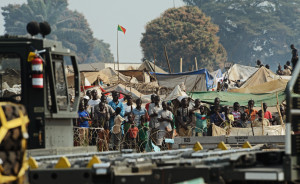The Future of the Central African Republic’s Factionalism Rests in Next Elections
Last week, after a five-day visit to the Central African Republic (CAR) by the head of the Africa Bureau at the UN Development Programme (UNDP), the United Nations (UN) decided to fully endorse and provide support for the parliamentary and presidential elections scheduled for July and August of this year. After a recent history of bloodshed and hatred, the UN believes holding elections is the best chance the country has to restore hope and begin a process of reconciliation through democracy and social and economic development.

Since it gained independence from France in 1960, CAR has been shaped by dictatorial rule reached through multiple coup d’états, corruption and significant poverty. Due to this continual political instability, the role of violence and coercion has been key in the development of the state since independence. The most recent and transcendental conflict started in March 2013 when Muslim Seleka rebels took control of the country, formed by a Christian majority.
The Seleka threatened to overthrow then-President Bozizé and justified the insurgency as a response to the government’s failure to comply with peace accords made in 2007. The clash between the Seleka and the weak Central African military and police forces has left thousands of people dead and over a million displaced. The offensive ended in 2014, when the Seleka returned to the northeast part of the country after facing the Christian militias’ retaliation and international pressure. In January 2014, Catherine Samba-Panza was elected as new interim president. She pledged to restore peace, however the safety and security of the region remains volatile .
The UN sees the upcoming elections as a crucial opportunity and potential turning point in the country’s politics and future. By consequence, the organization is leading a peacekeeping mission known as “MINUSCA to guarantee safety in the state, with the stated aim that the upcoming elections meet standards for free voting.
In order to re-establish CAR as a functioning state, the first step must be to guarantee the security of those in the country. Abdoulaye Mar Dieye, the head of the Africa Bureau of UNDP stated, “wherever there is security, you can trigger not only the return of the civil servants but the return of development and economic activities.” Mar Dieye also noted that the UN must deploy its forces as quickly and effectively as possible to ensure a sense of safety that will encourage citizens to freely cast their votes. In line with this recommendation, UN Secretary General Ban Ki-Moon demanded the UN Security Council expand the peacekeeping forces by 1,030 troops, making for a total of 13,000 on the group in CAR. With an increase in security, the UN hopes to influence not only a better turnout in the elections, but also the revival of the economy and the slow creation of a state infrastructure formed by now-absent civil servants.
If the UN does not assist the Central African military and police forces, it is likely that the electoral process will be faulty and ultimately lead to more violence. Moreover, little social and economic development will be made if people do not feel they have the state’s protection. No forward progress can be made until this solution is resolved. The UN’s role will also be crucial in diminishing social disparities and creating a national narrative comprising the construction of a new state. Despite the prevalent narrative of factionalism in Sub-Saharan African states in recent times, unification of a country has worked and can work again. The enormous need for humanitarian assistance and collective therapy to ease social tensions cannot be provided by the country’s weak institutions that are in some sectors nonexistent. Lastly, the presence of strong peacekeeping forces in the country and region is crucial to prevent groups such as the Seleka from working together with others like Boko Haram – a coalition that would threaten the entire region of Central Africa.
At a crucial moment in CAR’s recent political history, the UN’s efforts should be more widely supported by Western countries so that hope will be regained among the citizenship and economic and social development can be revived. CAR’s stability is not only important domestically but also for the whole region, which has been scarred with violence and hatred for the past 60 years. CAR could and should be the first country to restore stability and peace, leading the path for other neighboring states.
